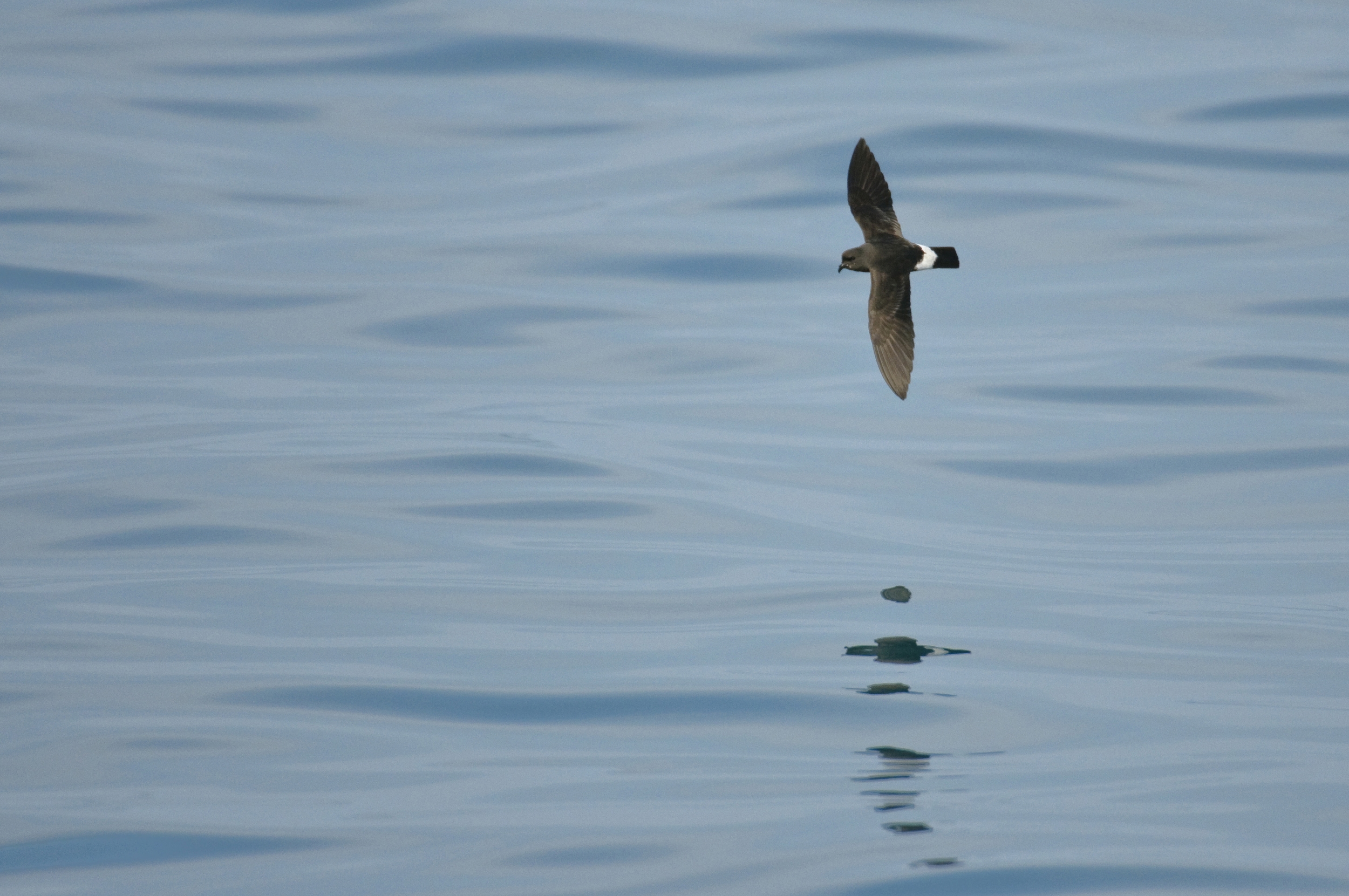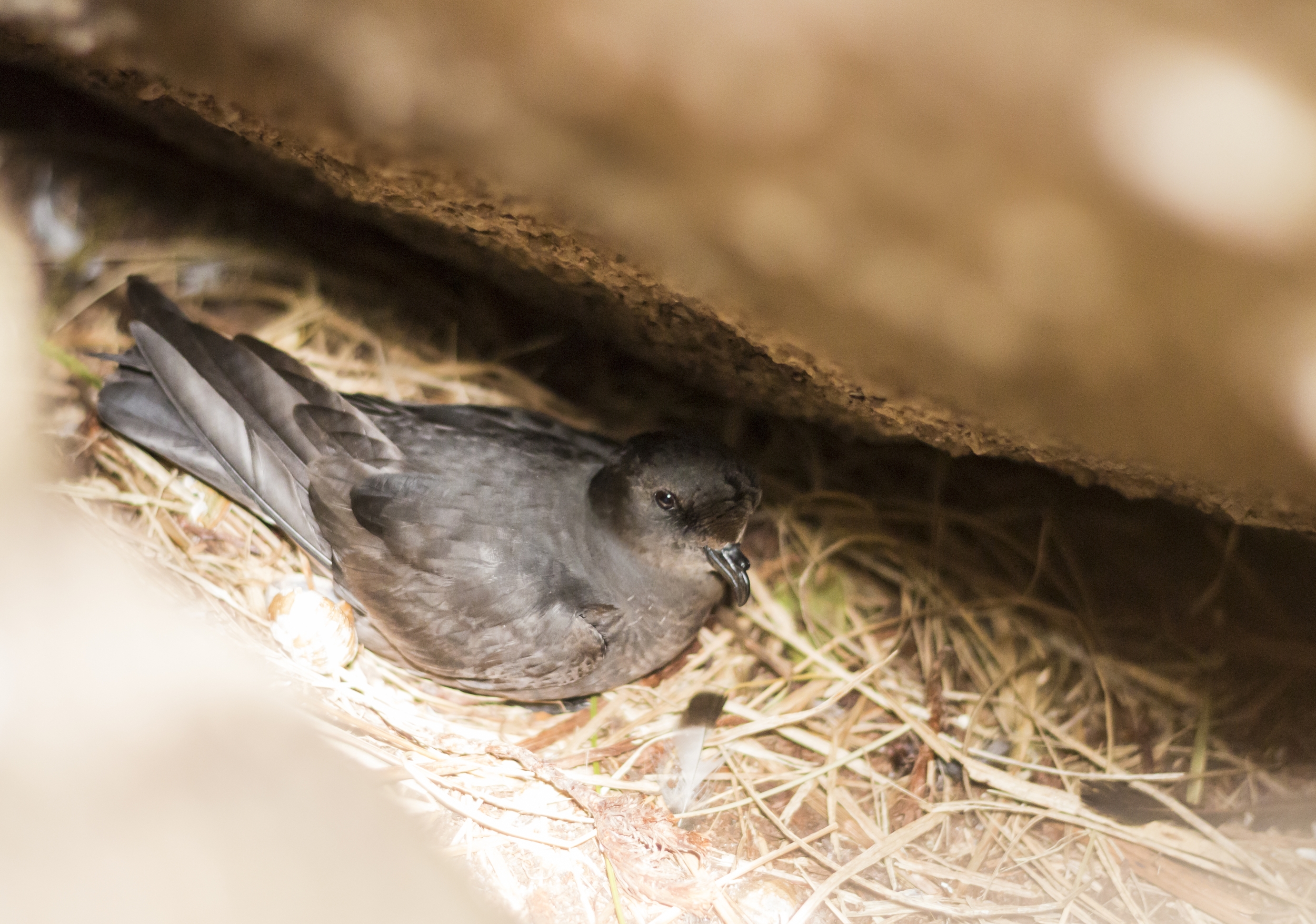
Storm Petrel. Photo: Chris Gomersall (rspb-images.com)
RSPB press release:
First storm petrel chick for Shiant Isles
Project records calls from burrow
A European storm petrel chick has been recorded calling on the Shiant Isles for the very first time. This is an important step for the Shiant Isles Recovery Project as it’s the first known breeding of these seabirds on the islands. The EU LIFE+ funded project played an artificial call of an adult storm petrel outside the suspected burrow nest site to record the chick’s reply call and confirm its presence.The project, a partnership between RSPB Scotland, Scottish Natural Heritage and the Nicolson family, the custodians of the islands, has been working over the last four years to make these islands, five miles off the coast of Harris, a safer place for Scotland’s globally threatened seabirds to breed. Island restoration projects such as this one are a key part of helping Scotland’s struggling seabird populations develop resilience to ensure their long term survival.
Storm petrels were not able to breed successfully at the Shiants because of their vulnerability to predation from the islands’ population of invasive non-native black rats. These were eradicated over the winter of 2015/16 and the islands were officially declared free of rats earlier this year.
Following the eradication, the project has been working to attract storm petrels to breed on the islands as it has ideal habitat for their nests in the many areas of boulders around the islands. These birds are little bigger than sparrows and only come to land in summer to breed. Scotland’s internationally important population currently nests at only a few offshore islands because of the presence of ground predators at other potential sites.
During the summer of 2017, calling storm petrels were recorded on the Shiants for the first time. This distinctive “churring” call was heard from burrows giving a strong indication that the birds were attempting to breed. However, no chicks were recorded so it was unclear whether they had been successful in hatching a chick.
Dr Charlie Main, Senior Project Manager for the Shiant Isles Recovery Project said, ‘It’s fantastic that this storm petrel chick has been recorded on the Shiants. After the adult was recorded last year we thought it highly likely that they were breeding so to have this confirmed now is great for the project and for the species in Scotland. It’s also another vital step for making these islands a safer place for Scotland’s internationally important seabirds, many of which are struggling to cope with the impact of climate change and a lack of suitable secure breeding sites.
We’ve strong hopes for the future that more storm petrels will breed here and a colony will be established. Three other calling adults were recorded this summer suggesting that there may have been more breeding attempts. This one chick is incredibly special to everyone who has been involved in the project since 2014; it means that all the work we’ve been doing to make and keep these islands free of invasive predators is paying off. It also shows just how quickly island restoration can make a difference to seabirds which is really positive for future projects like this one.‘.
Adam Nicolson said, ‘The tiny, vulnerable peeping of the storm petrel chick was one of the most optimistic sounds to have been heard on the Shiants in living memory. In that one sound, and extraordinarily quickly, all the effort, skill and organisation of the Shiant Isles Recovery Project has already begun to find its reward. This is only the beginning. At a time when the news from the natural world is consistently dire, this is a small move in the other direction, and one which carries within it at least some hope for a better future.‘.
Dr Andrew Douse, Policy and Advice Manager for Ornithology at Scottish Natural Heritage (SNH), said, ‘The recovery of storm petrels on the Shiant Isles was one of the key aims of this project so to see it beginning to happen so quickly is excellent news. Hearing the call of a chick for the very first time is a real milestone and a vindication of the benefits of removing non-native species from the islands. This has been a fantastic partnership project and as it draws to a close, SNH pays tribute to RSPB Scotland and the Nicolson family for everything that has been achieved.‘.
The project is due to draw to a close this autumn and is currently focused on securing the biosecurity legacy for the islands to ensure that no other ground predators, which would threaten its special wildlife, are able to establish themselves on the Shiants.
Ends

Storm Petrel. Photo: Ed Marshall (rspb-images.com)
[registration_form]
This is a really great achievement by the RSPB and its partners. Many congratulations to all concerned.
Because of its many successes in standing up for wildlife (it sometimes has a few failures, but not often) the RSPB can provoke some jealousy and resentment in a few quarters with much interest in their own vested interests and little interest in our serverely threatened natural world. As a result there are those that take opportunities to decry the RSPB.
We must see them for what they are and realise that without the RSPB we would have already lost a lot of wildlife here in the UK and around the world.
An absolutely cracking result for those involved. The teams involved in the eradication work, put in an awful lot of hard work into this including having to live in prefabricated accommodation and in terrible weather conditions. Will those ‘real conservationists’ at the Scottish Gamekeepers Association applaud them for their work? Not likely as can’t remember them celebrating the efforts of any non keeper ever, as if to say only keepers do conservation. The RSBP was involved in this so there was the predictable, knee jerk reaction to the news of this project from who you’d expect. Their angle was that the RSBP only cared about birds because it was going to get rid of part of our mammalian heritage – yes that’s right the introduced black rat which exists in untold millions in its native range was being put in front of conserving globally important populations of rare seabirds just to have a go at the RSBP. Brilliant result.
Great news!